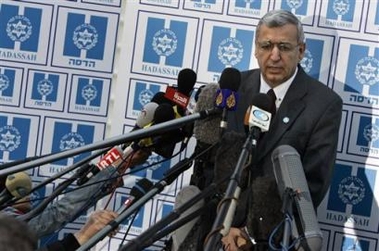|
Doctors remove part of Sharon's intestines
(AP)
Updated: 2006-02-12 08:40
Doctors removed nearly 2 feet of Ariel Sharon's large intestines Saturday
during emergency surgery, his seventh operation since suffering a debilitating
stroke last month.
Surgeons managed to stabilize the comatose Israeli prime minister after
initially fearing for his life, but the latest complication makes it even more
unlikely he will recover.
Israelis closely followed their 77-year-old leader's latest ordeal, with TV
stations repeatedly breaking into regular programming for updates, but the
country already has come to terms with his departure from politics.

Dr. Shlomo
Mor-Yosef, director of Hadassah Hospital, speaks to the media outside the
emergency room where Israeli Prime Minister Ariel Sharon remains in a coma
since suffering a stroke on Jan. 4, in Jerusalem Saturday Feb. 11, 2006.
Doctors removed part of Sharon's large intestine during emergency surgery
Saturday, but there was no immediate threat to the ailing leader's life,
hospital officials said.[AP] |
Sharon's political heir, Ehud Olmert, quickly took the reins as acting prime
minister after Sharon's Jan. 4 stroke and appears poised to lead Sharon's
centrist Kadima Party to victory in March 28 elections.
Sharon was rushed to surgery Saturday morning after doctors, who had noticed
abdominal swelling, conducted a CT scan and a laparoscopy, or insertion of a
small camera through the abdominal wall.
Surgeons detected necrotic — or dead — tissue in the bowels and removed 20
inches of his large intestine, Hadassah Hospital director Dr. Shlomo Mor-Yosef
said.
The necrosis was caused either by infection or a drop in the blood supply to
the intestines, something common in comatose patients, the hospital director
said. Mor-Yosef said doctors did not find blocked blood vessels.
Mor-Yosef said Saturday's surgery was relatively simple, and that Sharon's
main medical problem continues to be the coma. Asked whether Sharon could come
out of the coma, Mor-Yosef said: "All possibilities remain open, but with each
passing day, the chances are lower."
Since the stroke, Sharon has been hooked up to feeding and breathing tubes.
President Bush was being kept informed of Sharon's condition by his staff,
White House spokesman Scott McClellan said Saturday.
"Prime Minister Sharon remains in our thoughts and prayers during this
difficult time," McClellan said.
Dr. R. Sean Morrison, a professor of geriatrics at the Mount Sinai School of
Medicine in New York, said "long-term comatose patients typically die of
complications like this," referring to necrosis.
Morrison said Sharon's prognosis was extremely grave even before the latest
complication, and his chances for survival are now "extremely small, almost
zero."
In recent months, the obese Sharon had repeatedly brushed aside questions
about his health, but his condition became an issue after he suffered a mild
stroke Dec. 18.
At the time, Sharon was at the height of his popularity, following last
summer's successful pullout from the Gaza Strip and his break with the hard-line
Likud Party.
Voters widely expected Sharon to draw Israel's final borders, with or without
the Palestinians, if elected for a third term. Polls suggested Kadima would
become by far the largest party in parliament.
Sharon, a war hero, had for years opposed concessions to the Palestinians. He
came to accept the idea of giving land to the Palestinians and allowing them to
form a state only during his most recent term as prime minister, which began in
2003.
After his mild stroke, aides played down his health problems. Doctors treated
him with anti-clotting agents and scheduled a minor heart procedure for Jan. 5
to close a hole believed to have contributed to that first stroke.
Just hours before the scheduled procedure, Sharon suffered a massive stroke,
including heavy bleeding in the brain, and slipped into a coma.
After being admitted to Hadassah on Jan. 4, Sharon underwent three
back-to-back brain surgeries. These were followed by three smaller procedures,
including insertions of feeding and breathing tubes — a sign that doctors were
preparing for a long-term coma. Throughout the past five weeks, he had been in
critical but stable condition.
Before dawn Saturday, Sharon's condition deteriorated sharply and his life
was in danger, hospital officials said. Doctors decided to operate after
consulting with Sharon's sons, Omri and Gilad, Mor-Yosef said.
"During the operation, we found necrosis in part of his large intestine and
... the decision was to remove part of his large intestine," he said.
Experts have concluded that Sharon apparently suffered severe brain damage
and is unlikely to regain consciousness. If he does awaken, most say, the
chances of his regaining meaningful cognition or activity are slim.
Sharon's stroke had jolted Israel, but the transition period has been
surprisingly smooth.
Kadima has held steady in the polls, which predict the party will win at
least 40 of the 120 seats in parliament. This means Olmert would form the next
government, likely in a coalition with the dovish Labor Party.
In a TV interview earlier this week, his first since taking over, Olmert
suggested he would withdraw from large areas of the West Bank if elected, but he
did not make clear whether he would act unilaterally. Olmert said Israel will
give up the parts of the West Bank where most of the Palestinians live but
retain the main Jewish settlement blocs.
The Palestinians claim all of the West Bank as part of a future independent
state.
Unilateral action appears increasingly likely in light of the victory of the
Islamic militant group Hamas in last month's Palestinian parliamentary
elections. Olmert has said Israel will shun a Hamas government unless the group
— considered a terrorist organization by the United States and Europe —
renounces violence and recognizes Israel.
Hamas has killed hundreds of Israelis in attacks.
|